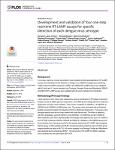Development and validation of four one-step real-time RT-LAMP assays for specific detection of each dengue virus serotype
Lopez-Jimena, Benjamin
Bekaert, Michaël
Bakheit, Mohammed
Frischmann, Sieghard
Patel, Pranav
Simon-Loriere, Etienne
Lambrechts, Louis
Duong, Veasna
Dussart, Philippe
Harold, Graham
Fall, Cheikh
Faye, Oumar
Sall, Amadou Alpha
Background:
4 one-step, real-time, reverse transcription loop-mediated isothermal amplification (RT-LAMP) assays were developed for the detection of dengue virus (DENV) serotypes by considering 2,056 full genome DENV sequences. DENV1 and DENV2 RT-LAMP assays were validated with 31 blood and 11 serum samples from Tanzania, Senegal, Sudan and Mauritania. DENV3 and DENV4 RT-LAMP assays were validated with 25 serum samples from Cambodia.
Methodology/Principal findings:
4 final reaction primer mixes were obtained by using a combination of Principal Component Analysis of the full DENV genome sequences, and LAMP primer design based on sequence alignments using the LAVA software. These mixes contained 14 (DENV1), 12 (DENV2), 8 (DENV3) and 3 (DENV4) LAMP primer sets. The assays were evaluated with an External Quality Assessment panel from Quality Control for Molecular Diagnostics. The assays were serotype-specific and did not cross-detect with other flaviviruses. The limits of detection, with 95% probability, were 22 (DENV1), 542 (DENV2), 197 (DENV3) and 641 (DENV4) RNA molecules, and 100% reproducibility in the assays was obtained with up to 102 (DENV1) and 103 RNA molecules (DENV2, DENV3 and DENV4). Validation of the DENV2 assay with blood samples from Tanzania resulted in 23 samples detected by RT-LAMP, demonstrating that the assay is 100% specific and 95.8% sensitive (positive predictive value of 100% and a negative predictive value of 85.7%). All serum samples from Senegal, Sudan and Mauritania were detected and 3 untyped as DENV1. The sensitivity of RT-LAMP for DENV4 samples from Cambodia did not quite match qRT-PCR.
Conclusions/Significance:
We have shown a novel approach to design LAMP primers that makes use of fast growing sequence databases. The DENV1 and DENV2 assays were validated with viral RNA extracted clinical samples, showing very good performance parameters.
Files in this item

